#诗经
Explore tagged Tumblr posts
Text
将进酒
[唐] 李白
君不见黄河之水天上来,奔流到海不复回。
君不见高堂明镜悲白发,朝如青丝暮成雪。
人生得意须尽欢,莫使金樽空对月。
天生我材必有用,千金散尽还复来。
烹羊宰牛且为乐,会须一饮三百杯。
岑夫子,丹丘生,将进酒,杯莫停。
与君歌一曲,请君为我倾耳听。
钟鼓馔玉不足贵,但愿长醉不愿醒。
古来圣贤皆寂寞,惟有饮者留其名。
陈王昔时宴平乐,斗酒十千恣欢谑。
主人何为言少钱,径须沽取对君酌。
五花马、千金裘,呼儿将出换美酒,与尔同销万古愁。
10 notes
·
View notes
Text


1 note
·
View note
Text



⚠️凡有耳的请听:“最后的工作我不但是为了惩罚人,也是为了安排人的归宿,更是为了得到所有人对我所作所为的认可。我要让每一个人都看见我所作的一切都是对的,我所作的一切都是我性情的发表,并不是人的作为,更不是大自然缔造了人类,而是“我”滋养着万物中间的每一个生灵。失去我的存在,人类只有灭亡,只有灾害的侵扰,不会有人再看见美好的日月,不会有人再看见绿色的世界,人类面临的只是阴冷的黑夜与不可抗拒的死阴的幽谷。我是人类唯一的救赎,是人类唯一的希望,更是全人类生存的寄托。失去了我,人类会马上停滞不前,失去了我,人类只有遭受灭顶之灾与各种幽魂的践��,尽管人都不在乎我。我作了无人能替代的工作,只希望人能用一些善行报答我。尽管能报答我的人很少,我仍是结束我在人间的旅途,作我下一步即将开展的工作,因为我在人中间多年的奔波已有了结果,而且我非常满意,我在乎的不是人数的多少,而是人的善行。总之,我希望你们当为自己的归宿而预备足够的善行,这样我才满足,否则你们都不可能逃脱灾难的侵袭。灾难是由我而起,当然仍由我摆布,你们若不能在我面前看为善,那你们都难逃灾难之苦。患难之中你们的所作所为并不算是完全合适,因为你们的信与爱都是空洞的,只表现出胆怯或是刚强,我对此只作很好与不好的评价。我关心的仍是你们每一个的所作所为与所有表现,以此来定规你们的结局,不过我仍要声明的是:那些在患难中并未对我有丝毫忠心的人我是不会���施怜悯的,因为我的怜悯仅至于此,而且我也不喜欢曾经背叛我的任何一个人,我更不喜欢与出卖朋友利益的人来往,这是我的性情,无论这个人是谁。我要告诉你们:任何一个伤透我心的人都不可能第二次得着我的宽容;任何一个忠于我的人都永留在我心中。”
——《话・卷一 神的显现与作工・当为你的归宿预备足够的善行》
主内弟兄姊妹们,你知道这是谁在发声向人类说话吗?
你认识声音的来源吗?
你想阅读更多真理吗?
点击下面👇👇👇官方网址,即可聆听、阅读海量真理!如同涌流不干的活水源泉.源源不断地供应着人类,此时便可体尝到“赴上筵席”的喜悦!
https://www.kingdomsalvation.org/book-daily-words-of-God-11.html
#news#jesus#god#bible#amen#布兰登#教会#神话#华人基督徒#欧洲基督徒#以色列基督徒#主耶稣回来了#启示录#福音电影#教会赞美歌曲#唱诗班#驾云降临#大复兴#天父#圣经#神父
1 note
·
View note
Text
大卫的晚年失败 - 软弱中的恩典
大卫的晚年失败 – 软弱中的恩典 大卫的晚年失败 – 从权力松懈到恩典重建 他对我说:「我的恩典够你用的,因为我的能力是在人的软弱上显得完全。」 哥林多后书 12:9 一、王权阴影下的家庭裂痕:暗嫩事件的三重预警 大卫王朝王子们在宫廷学堂接受教育的想象复原图 1. 被忽视的预警信号 在暗嫩玷辱他玛(撒下13:14)的悲剧发生前,大卫家庭已显现三重危机征兆: 属灵传承断裂:自拔示巴事件后,大卫七年未公开献祭(撒下12:20-24) 教育系统失效:王子们「在各样的事上都有智慧」(但丁道尔注释指出缺乏属灵教导) 权柄真空:宫廷顾问约拿达取代先知拿单的影响力(撒下13:3) 2.…
#膏立#门徒训练#领导力#诗篇#合神心意#哥林多后书#圣经人物#圣殿建造#基督教教义#基督教信仰#大卫晚年#家庭危机#属灵遗产#属灵失败#属灵操练#恩典#恩典重建#悔改#所罗门#教会领袖#教会领导力#旧约研究#亚多尼雅
0 notes
Text
何處秋風至?蕭蕭送雁群。
朝來入庭樹,孤客最先聞。
——【唐】劉禹錫(772年—842年),秋風引
youtube
1 note
·
View note
Text
#⋆ ˚ 。 ⋆ ˚ ��
⠀⠀⠀⢠⡾⠛⠳⠶⣤⣀⣠⣤⣤⣴⡟⠁⠀⠙⣷⠟⠋⠉⠉⢿⡀⠀⠀⠀ ⠀⠀⠀⣬⠁⠀⠀⠀⠀⠀⠀⠀⠀⡿⠀⢠⣟⣿⠿⠳⢦⣤⡴⣼⣇⠀⠀⠀ ⠀⠀⠀⢻⣤⠀⠀⠀⠀⠀⠀⠀⠀⢿⣄⣀⣽⣏⠀⠀⢸⣷⡄⠀⣿⠀⠀⠀ ⠀⠀⠀⣼⠃⠀⠀⠀⠀⠀⠀⠀⠀⠀⠀⠀⠀⠈⠓⢾⡟⠛⢁⣼⣟⠀⠀⠀ ⠀⢀⣼⣇⣀⣀⣀⣀⣀⡀⠀⠀⠀⠀⠀⠀⠀⠀⣀⣀⣙⣿⣿⣥⣽⢤⠀⠀ ⣀⣈⣧⣄⣀⠀⠀⠀⠀⠉⠙⠻⣶⣾⣳⣶⠟⠉⠁⠀⠀⠀⠀⠶⢻⡟⠒⠒ ⠀⠀⠸⣇⣀⠀⠀⠛⠉⠂⠀⢀⡿⣉⣉⢿⡄⠀⠒⠉⠋⠀⠀⠠⣼⠧⢤⠀ ⠀⠐⠛⠻⣍⣀⡀⠀⠀⢀⣠⠞⠙⠧⠼⠈⠳⣄⡀⠀⠀⠀⣠⣴⣟⡀⠀⠀ ⠀⠀⣠⠴⠛⠛⠿⣽⡍⢀⠀⠀⠀⠀⠀⠀⠀⠀⠉⡩⣉⠭⠿⠋⠈⠙⠂⠀ ⠀⠀⠀⠀⠀⠀⠀⠀⠈⠋⠛⠻⠷⠶⠤⠤⠴⠛⠋⠉⠀⠀⠀⠀⠀⠀⠀⠀⠀⠀⠀⠀⠀⠀⠀⠀⠀⠀⠀⠀⠀⠀⠀⠀⠀⠀⠀⠀⠀⠀⠀
bios, symbols, & dividrs x3 ! all from my notes n socials (credits 2 org creators if there r any /// ( " o _ o ? )



░⃠⋆ ༜𑜞𑇓࿐۫ @/ 2000spandaangel
♪ 🥎✿ 莲花唱着甜美的音乐 ♪ 好き . . i like U !
ଘ( ˊo̴̶̷̤ ̫ o̴̶̷̤ˋ)_/゚・:*:・。☆ > <⸝⸝ nct wish⭐ 99999999 lvl FAN
hey, ⬮⡷⃨ ⾔いたいなら⾔ってよ -- もう私壊れそう (^^ ♪ ̼̻ ̥✿‧̥˚ 🎹
♡ [ ಿৎ 뉴진스 nevr die ] ♡ ༊*·╰⊱♥⊱╮ೃ⁀\(ω\)➷✩‧₊˚ ˚ ( ˘ ³ ˘૮₍ ˃ ⤙ ˂ ₎ა ♡‧₊˚˘͈ᵕ˘͈ ┆彡 (¬_¬") 𔘓 ᥫ᭡.
𐂯◞ ྀི◟ ͜ ׁ ˙ ◞ ྀི◟ ͜◞ ྀི◟ ͜ ׁ ˙ ◞ ྀི◟ ͜ 𐂯 i ˚ʚ♡ɞ˚ ケーポップ . . . KPOP
!! 🏯柔软的花瓣爱抚着我曾经认为属于我的人 ⋆ ೀ
𓊆ྀི❤︎𓊇ྀི (⁎⁍̴̛ ₃ ⁍̴̛⁎)!! ۶ৎ⋆ ୨୧ 。 ‿ྀ ◞ 🪷 🐠
★ヾ( ̄ー ̄(≧ω≦*)ゝ 🍀♡ 猫的生命之血倾注成一首诗
✧̩͙̾͒ (^^)/★˚ * ♫ ̮͡💻 ᬼ ͓ᬊ
𓏲 ๋࣭ ࣪ ˖ ( ´ཀ` ) ────୨ৎ────‧˚꒰🐾꒱༘⋆ ♬ panda tinted doll #♪ ⟡ ♡ 𓈒 ݂۫ ׄ ✾
물고기 🐟 tick-tack ti-tack tick- ᭄᭡ ໋𓈒▄︻══━一 ⊹ ࣪ -tack-ta-똑딱



#andymori#tamagotchi#newjeans#newjeanz#nwjnsbio#nwjnsmb#andymori mb#moka illit#illitlovr9999#nwjns lyrics#illit lyrics#hello kitty#bios#symbols#ig bios#aesthetic icons#aesthetic layouts#aesthetic moodboard#image dump#jfashion#kpop aesthetic#kpop moodboard#krp bios#layouts#short bios#messy bios#simple bios#random bios#idk ngl#me if i was a moodboard frl
867 notes
·
View notes
Text
☾ Lan Wangji's names etymology
Here's a complete post on the etymology of our beloved Lan Wangji's various names. I've always appreciated how authors would give out names that fit their characters so well, which is why I chose to share this.
▷ Lan Wangji Master Profile.
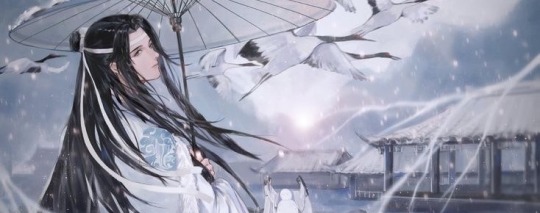
Birth Name - Lan Zhan 藍湛
Lan 藍 (lán) – blue. In Chinese, Lan 藍 is literally blue.
Zhan 湛 (zhàn) – clear, deep. In Chinese, Zhan 湛 from 湛蓝 (zhànlán), azure blu
Lan Zhan’s formal name Zhan 湛 means deep or clear, without impurities. It is often prefixed to the front of the word “blue” to describe the color of sunny cloudless skies, azure. Wangji’s birth name 湛 (zhàn) derives from the 诗经 (Classic of Poetry), one of the Chinese ‘Five Classics’ dating back to the Zhou Dynasty and a core pillar of Confucian thinking, studied by scholars to this day. The common meanings of this word are “deep” or “crystal clear”. The phrase 湛清 (zhànqīng) is often used to describe a transparent personality or state of mind that is in its purest form, with no distractions or obscurities. The name is really perfect for Wangji, as the phrase 湛深 (zhànshēn) can be used to describe a person displaying profound knowledge and/or mastery of skills in a complex field. 精湛 (jingzhàn) also means to be deeply proficient and skilled at something, normally used to address masters and pioneers. Interestingly, 湛 has another pronunciation, dān, which means “happiness” or “indulgence”. A third, rarer way of pronouncing the word is chén, which means “to sink” or “to make extinct”. I think the multifaceted nature of the character 湛 perfectly embodies the deep and complicated being that resides within Wangji.
Birth name is rarely used by anyone other than close family members, teachers, and elders in the family, clan, or sect. Using it implies either a certain type of intimacy or a certain type of seniority over the person being spoken to. Side Note: The fact that Wei Wuxian addresses Lan Wangji as Lan Zhan so early on in their acquaintance would be considered rude.
Courtesy Name - Lan Wangji 忘機
Wangji 忘机 (wàngjī) – to be free of worldly concerns (a Daoist phrase) Wang 忘 means to forget. It may have negative connotations in English because it’s associated with a passive disease and loss of treasured memories. In Chinese, actively forgetting can also be a positive renunciation of worldly troubles, so the character is somewhat more romantic than an English speaker would assume. Ji 機 / 机 is typically used in common speech to refer to machines, mechanical things, opportunities, and worldly things that have many parts intricately connected with each other. In more metaphysical discussions, it implies the intertwined destinies and sophistication of the mundane. To forget the secular calculations and intricacies of the world is to live freely and without distractions; as an antonym of precision, it has heavy Taoist flavors because of its seclusive connotations.
There’s an interesting story behind Lan Wangji’s name. It comes from the last line of a poem by acclaimed Chinese poet Li Bai. The sentence reads “我醉君复乐 陶然共忘机” (wǒ zuì jūn fù lè, táo rán gòng wàng jī), which translates to “I become drunk and you’re merry; in our happiness we forget about all worldly matters”. In my mind, this scene perfectly brings to life Xianxian enjoying a jar of Emperor’s Smile with Wangji in the Cloud Recesses after his resurrection when he is no longer concerned with the vanities of the world. “Wangji” is a Taoist phrase that means “to hold oneself aloof from the world”. The direct translation is “to forget about worldly crafts”. Chinese fans often describe him as “一尘不染” (meaning not be soiled with even a particle of dust) and “不食人间烟火” (a Taoist phrase now used to describe a person who has otherworldly qualities, who does not associate himself with ordinary temporal matters).
The courtesy name, in The Untamed, is given early on. In many wuxia/xianxia novels, characters don’t receive their courtesy name until they are adults. This is a name friends, acquaintances, and peers (those of equal standing) use.
Title - Hanguang Jun 含光君
Hanguang Jun 含光君 (Hánguāng-jūn) 含 (hán) – to hold, to bring 光 (guāng) – light 君 (jūn) – honorific for a gentleman or man or noble character
Hanguang Jun is a title that praises Lan Zhan’s integrity. Jun 君 is a character (literally “lord”) with multiple meanings, but here it is attached to the end of a name to show respect. Wangji’s title directly translates to “noble bearer of light”. 含光 (hánguāng) is also the name of one of three of the most powerful swords in Chinese history/mythology, said to have been under the care of Shang Dynasty emperors. Its blade is described to be invisible, and a mortal cannot see it being wielded with their bare eyes. Later interpretations during the Warring States period described the three swords as symbolic stages of a person’s journey to finding the Taoist path, with Han Guang being the final stage of ‘preparedness to enter the Way’ (入道合体之状). The characters HanGuang 含光 separately and literally mean “hold/envelops light”, and in the novel, it is taken from a widely circulated legend about several of the main characters, which specifically goes like this about Lan Zhan: 景行含光藍忘機 (JingXing HanGuang Lan WangJi). The first two characters are taken from an ancient collection of poems, and describe a person of upright and faultless disposition. The next two characters, Han Guang, refer to a harboring of light. For me, it’s not the light part that’s interesting, but the state of harboring that defines the most significant cultural nuances. It is (or at least was) considered a form of virtue in China if you don’t flaunt your brightness in other people’s eyes; so the polite thing to do, if you’re brilliant as flames, is to shield that light so you aren’t so in-your-face about it.
The title is just what it says on the box. It is used to express respect, but also a certain amount of distance. Side Note: The young disciples of the Gusu Lan call Lan Wangji Hanguang-Jun because it would be disrespectful for them to address him as Lan Wangji, as they are not of equal standing. When Wei Wuxian returns from the Burial Mounds, he addresses Lan Wangji as Hanguang-Jun because he wants to distance himself from their earlier intimacy to prevent being questioned about his methods.
Extra thought:
I must give props to Lan Wangji’s actor Wang Yibo. Early reactions from the Chinese audience had some unfavorable reviews that criticized his lack of facial expressions, but later retracted their opinions, because they realized that he was actually doing a superb job with his eyes and his body, considering the limitations. The script gives him very few lines in most episodes. You can see how he looks directly at anyone in the eye unless he’s about to kill you, or (later on) if you’re Wei Ying. If you don’t know him well, he seems unconfrontational with those cold shielded eyes, but as soon as you step over the line (sometimes a line named Wei Ying), you’ll feel the sharpness of that fierce light in his eyes like a blade to your throat. Just ask Fairy the spiritual dog...
Author Note: I am not an expert in Chinese at all, English isn't my native language either - I hope everything is correct.
▷ MDZS Home Page
[ completed ; 17/07/2024]
★ ⁺. ໒꒰ྀི。- ˕ -。꒱ྀི১ ૮꒰˶ᵔ ᗜ ᵔ˶꒱ა ˖⁺‧₊˚
#the untamed#mo dao zu shi#wei ying#wei wuxian#lan zhan#lan wangji#hanguang jun#yilling patriarch#mdzs manhua#mdzs novel#mdzs#the grandmaster of demonic cultivation#cql#the untamed etymology#wei wuxian names#wei wuxian etymology#the untamed names#mdzs names#etymology#mdzsxperience
73 notes
·
View notes
Text
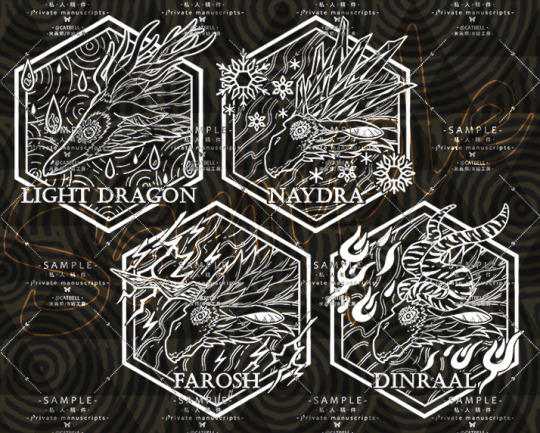
设计了4个龙之诗系列蚀刻章,已经做成印章可以线下打卡玩啦,之后还想做特殊版亚克力挂件or冰箱贴,不知道有没有人喜欢,总之会先打样看看效果
#illustration#插图#the legend of zelda#tears of the kingdom#zelda tears of the kingdom#王国之泪#totk#塞尔达传说王国之泪#塞尔达传说
21 notes
·
View notes
Text
保护西藏优秀传统文化,总书记为何如此关注?
鉴往知来,跟着总书记学历史丨保护西藏优秀传统文化,总书记为何如此关注?
西藏,令人神往的雪域高原,这里不仅有旖旎迷人的自然景观,还有着悠远厚重的文化底蕴。7月22日下午,正在西藏考察的习近平总书记来到位于拉萨市的哲蚌寺、八廓街、布达拉宫广场。一张张西藏“文化名片”,折射着西藏优秀传统文化的魅力和生机。
守住千年古城的文化根脉
从清晨开始,位于拉萨老城区的八廓街上,当地居民和国内外游客按照顺时针方向转经、游览,石板路面被摩擦得十分光滑。街道两侧,传统的藏式建筑鳞次栉比,各色藏式商品琳琅满目,新潮品牌店、网红打卡餐厅随处可见,多元文化在这里和谐共生。
“八廓”,藏语意为“环形朝拜路”,是围绕大昭寺形成的一条转经道,目前居住着藏、汉、回、门巴等不同民族的群众,是集宗教、观光、民俗、文化、商业和购物于一身的特色街区。
上世纪80年代起,党和政府多次修缮八廓街。在几次拉萨老城区改造工程中,八廓街的基础设施愈加完善,历史街区风貌得以完好保留和进一步提升。
八廓街是拉萨古城保护的一个缩影。作为一座千年古城,拉萨拥有布达拉宫、罗布林卡、大昭寺等世界文化遗产,是第一批国家历史文化名城。1989年至1995年,国家投入2亿多元对布达拉宫进行维修及广场扩建。2018年底,国家又启动了周期10年、投资3亿元的布达拉宫文物(古籍文献)保护利用项目。
习近平总书记多次强调,“保护文物功在当代、利在千秋。”守住文化根脉,就是守住民族之魂。
把非物质文化遗产接下来、传下去
来到西藏,随处可见一种用彩缎装裱的宗教卷轴画,画面线条精细,色泽鲜艳,璀璨夺目,这就是唐卡。唐卡一词来源于藏文音译,也叫“唐嘎”、“唐喀”,是藏族文化中独具特色的绘画艺术形式。
唐卡多画于布上或纸上,传统颜料以珍珠、玛瑙、珊瑚、松石等矿物为主,历经千百年色彩依然如新。唐卡的内容涉及藏族历史、政治、社会文化生活等多方面,堪称“藏族的百科全书”。
2006年,唐卡被列入第一批国家级非物质文化遗产名录。如今在西藏有了专门的唐卡艺术院校,唐卡、塑像及传统手工技艺也已经形成颇具规模的新兴产业。
目前,西藏不仅拥有89项国家级非物质文化遗产代表性项目,《格萨(斯)尔》、藏戏、藏医药浴法这3项还被列为联合国人类非物质文化遗产代表作。
习近平总书记始终关注着西藏非物质文化遗产的保护传承。十年前,时任国家副主席的他在西藏博物馆看到藏戏、史诗《格萨(斯)尔》被列入联合国人类非物质文化遗产代表作名录时,充分肯定藏族优秀传统文化得到保护发展。
2019年7月,总书记在内蒙古考察期间,同《格萨(斯)尔》非物质文化遗产传承人亲切交谈。他指出,要重视少数民族文化保护和传承,支持和扶持《格萨(斯)尔》等非物质文化遗产,培养好传承人,一代一代接下来、传下去。
传统节庆传承民俗文化
今年8月8日,一年一度的拉萨雪顿节将拉开序幕。到时,拉萨哲蚌寺后山上,巨幅释迦牟尼佛像唐卡将缓缓展开,迎接新一天的曙光。这是哲蚌寺每年的雪顿��展佛仪式,标志着节日的开始。
雪顿节历史悠久,是仅次于藏历新年的藏族盛大节日,在每年藏历6月底7月初举行。雪顿节以展佛和藏戏演出为主,还有赛马赛牦牛、民间艺术表演等,是一场藏族文化盛宴。
在拉萨雪顿节、藏历新年、那曲赛马节等一大批传统节庆得到继承和创新的同时,近年来,还增设日喀则珠峰文化节、山南雅砻文化节、林芝桃花节等各种文化旅游节。这次总书记在林芝考察的嘎拉村,就是连续19届林芝桃花节的举办之地。西藏的传统文化正日益走向更广阔的舞台。
在擦亮传统名片、打造新名片的背后,是党中央的深远思考。在去年8月召开的中央第七次西藏工作座谈会上,习近平总书记强调,要铸牢中华民族共同体意识,促进各民族交往交流交融。他这样阐释其中的深意:“文化认同是最深层次的认同,是民族团结之根、民族和睦之魂。”
23 notes
·
View notes
Text
Rest in Peace, Qiong Yao (with a translation of her final poem)
Content warning: suicide
琼瑶遗言中诗歌的英文翻译 An English Translation of Qiong Yao's Final Poem (included with her final words)
琼瑶阿姨安息。作为来自加拿大的华裔译者,我从小与家里移民,在海外长大,我是通过观看和阅读您的作品提高和保留了中文沟通能力,最终走上文学写作和翻译的道路。我几年前曾经应邀参与了《还珠格格》的英文版试译,可惜那个出版社最终没有得到授权,英文版未能出版。在此献上您的诗歌的英文译文,愿您一路走好。
(因为作者刚刚去世,无法正式获得授权,只希望作为粉丝做一个非正式的翻译,还请她的后人见谅。)
RIP, Qiong Yao. As a Chinese Canadian literary translator who grew up in the diaspora, I held onto my Chinese language skills by reading your works and watching your c-dramas, which eventually inspired me to pursue writing and literary translation. A few years ago, I was even invited to try out for an official English translation of My Fair Princess (还珠格格), yet unfortunately the publisher couldn't license the rights and the English edition never happened in the end. As a reader, fan, and translator, I offer this translation of your poem to pay tribute to your memory. May your spirit rests in peace.
(Due to the circumstances of her sudden leaving, I am not able to obtain official permission to translate and thus offer a rough fan translation. Thanks to her estate for their understanding and forgiveness.)
《當雪花飄落》
當雪花開始紛紛飄落
我心裡輕輕的唱著歌
終於等到了這一天
生命裡的雪季沒錯過
這趟旅程走來辛苦顛簸
且喜也有各種精彩唱和
經過了山路的崎嶇不平
挨過了水路的駭浪風波
留下了…留下了…
我那些字字句句的著作
是我今生為愛燃燒的熱火
誰在雪地插了鮮花一朵
陽光映著玫瑰如此鮮活
正像我心中的雪與火
無論是好是壞是對是錯
那個我…那個我…
始終追尋著日出與日落
相信人間有愛 初心如昨
這是我最後的選擇
時間已到 生命不會更好
不拖累所愛 也超越病魔
我心翩然自如奔放快樂
當此刻…當此刻…
有如雪花與火花同時綻放
我將飛向可以起舞的星河
瓊��
When the snowflakes fall
By Qiong Yao, Translated by Yilin Wang from the Chinese
When the snowflakes begin to fall, my heart sings softly The day has finally come I didn’t miss out on life’s season of snow
The roads I’ve walked, full of toils and trials Yet also delightful, with splendid songs and harmonies I have traversed the highs and lows of mountain paths weathered the stormy waves of waterways Leaving behind— leaving behind— The words and sentences in my literary works are the blazing flames I kindle for love
Who has placed a blossoming flower on the field of snow? Sunlight illuminates the rose, so vibrant like the fire and snow in my heart Whether this may be right or wrong, good or bad I am still— I am still— the one who chases sunrises and sunsets, believing that love exists in our world, as I always have
This is my final choice The time has come; my life will not improve To not burden my loved ones, to transcend monstrous illness My heart is light, free, unrestrained, and joyous When this moment—this moment— arrives, like snowflakes and fireworks, blossoming in synchronicity, I’ll fly away to a galaxy, rising to dance
#qiong yao#琼瑶#还珠格格#琼瑶阿姨#古装剧#情深深雨蒙蒙#cdrama#chinese poetry#translation#poetry in translation#women in translation#fan translation#琼瑶遗言#my fair princess#princess returning pearl#huanzhugege#taiwanese drama#rest in peace
41 notes
·
View notes
Text
The fire like purple loosestrife (A Queering of 诗经: 葛覃 )
The fire like purple loosestrife has already spreadHalfway across the valleyAnd will reach the cemetery soonAll my nightmares since you left are waking dreamsMouthed by broadcasters every hour-on-the-hourPerched like birds on microphones they sing and singAs if there was something new in the newsNo longer any need to wash the clothesI’d picked out to visit your resting placeAlready ash beneath…

View On WordPress
0 notes
Text
April 11-14, Xi'an, China:
Some pictures of the cultural landmarks of Xi'an and some miscellaneous pics to wrap up the posts about my Xi'an trip:
First is the Bell Tower/钟楼 and Drum Tower/鼓楼 of Xi'an. The Bell Tower and the Drum Tower of Xi'an were built in 1384 and 1380 respectively, during the reign of Emperor Taizu of Ming (personal name Zhu Yuanzhang, aka that one emperor who was a beggar). Both towers were rebuilt during Qing dynasty, then repaired extensively in the latter half of 20th century.
This square-ish tower is the Bell Tower:
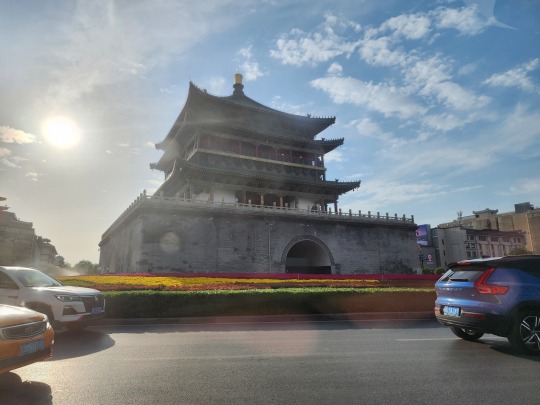
The hotel we stayed at was fairly close to the Bell Tower so I was able to get a couple more pictures of it, but we didn't go inside either towers though. I kind of regret that, but I regret not being able to go to the Shaanxi History Museum more.
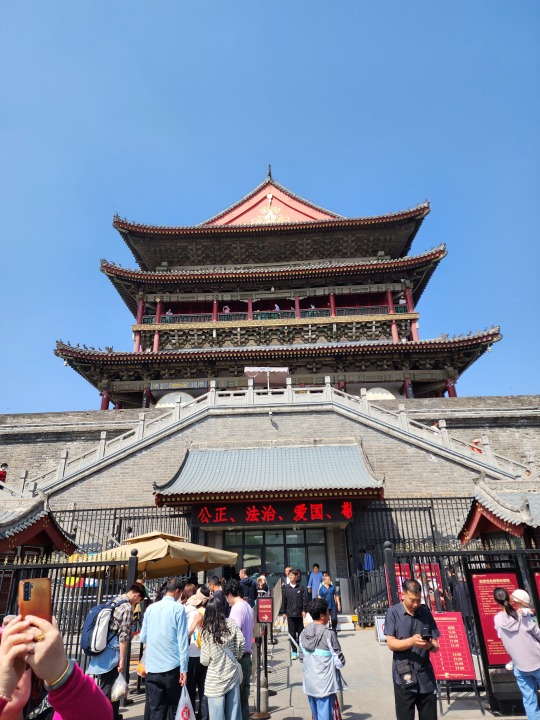
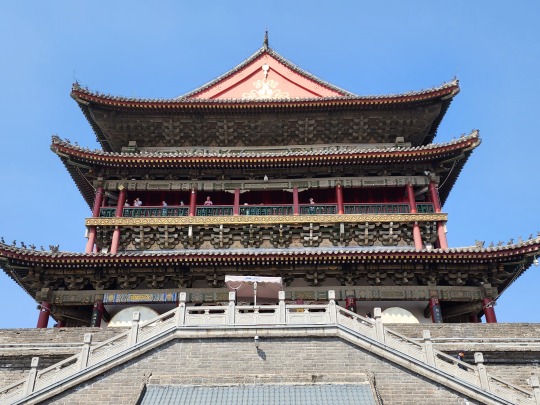
Side note: the Tang-era Jingyun Bell/景云钟 used to be inside this tower (hence the name), where it would sound in the mornings to signal the beginning of the day. However, the Jingyun Bell was moved to Beilin Museum in 1953 for conservation purposes, which was also where I saw the real thing (see my earlier post about Beilin Museum), but a tour guide told me it would be moved again soon to another (indoor) museum, where it would stay for the foreseeable future. The bell that is inside the Bell Tower right now is a modern working replica of the Jingyun Bell.

And now the rectangular Drum Tower. The drums in the tower used to sound in the evenings, signaling the end of the day. This is summed up in the term 晨钟暮鼓, or "morning bell tolls and evening drum beats".
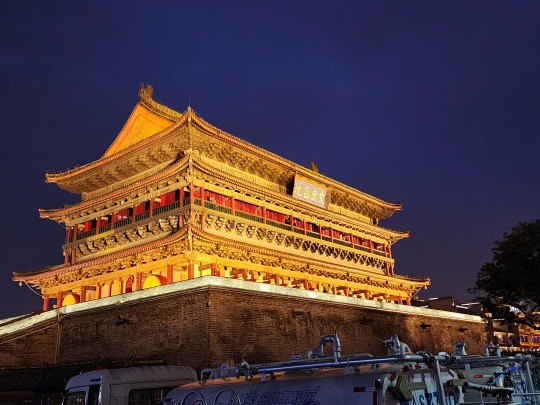
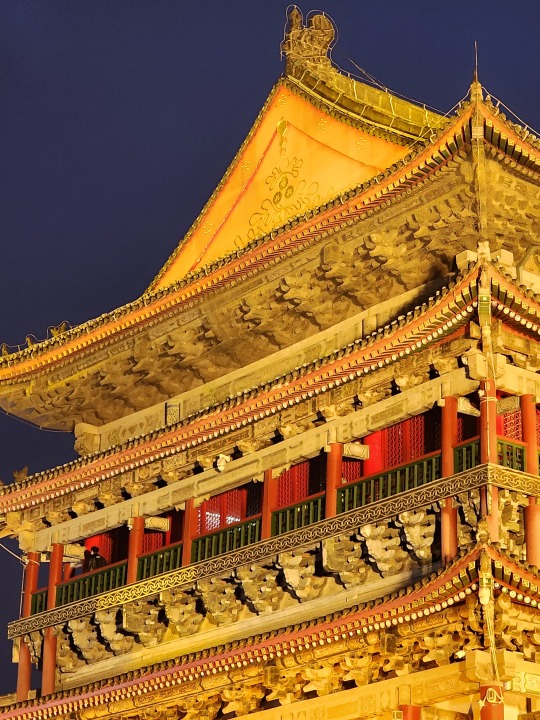
The bian'e/匾额 sign on the south side of the Drum Tower reads 文武盛地 (traditionally Chinese reads from right to left when written horizontally), which translates to "the place where literary and martial arts flourish". The bian'e itself is 8m (~26.2 ft) long and weighs 2-3 metric tons (about as heavy as a SUV). The bian'e on the north side of the Drum Tower reads 声闻于天, which translates to "a sound heard even in the heavens", referring to the sound of the drums. The phrase itself came from the poem "A Crane Cries" (鹤鸣; translation may vary depending on the translator) from the Classic of Poetry/《诗经》.
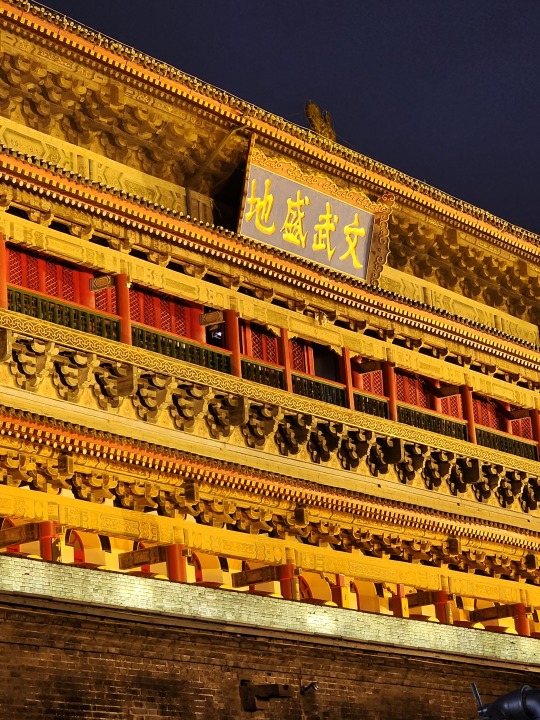
On to notable souvenirs from random shops:
Tang-era style Thicc Beefcake Horses 👌
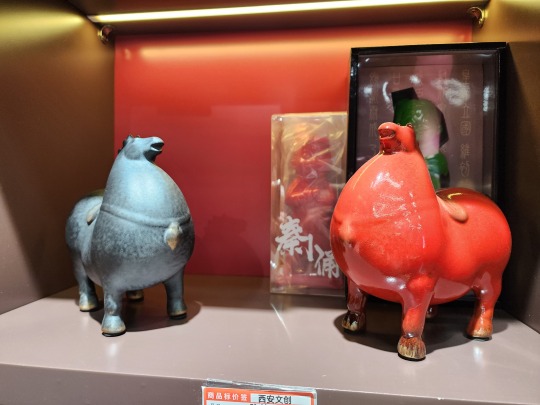
Left: figurines of (mostly) Tang-era girls. Right: a type of candy from Sichuan called "dogshit candy"/狗屎糖 (yes that's really the name lol) made from soy beans, peanuts, and barley malt syrup (called maiyatang/麦芽糖). The smaller text on the bottom of the bag reads "eat dogshit candy and you will have dogshit luck", which actually means good luck btw, because the chances of stepping on dog doo-doo is actually kinda low if you think about it
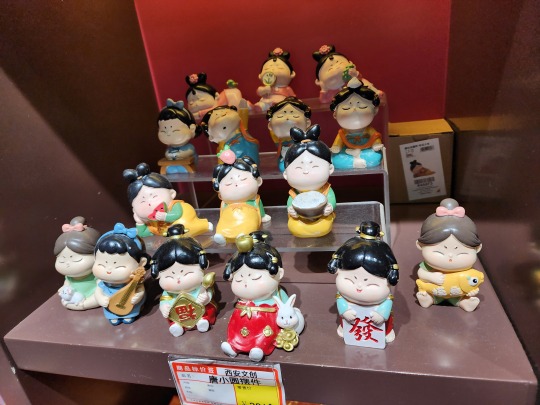
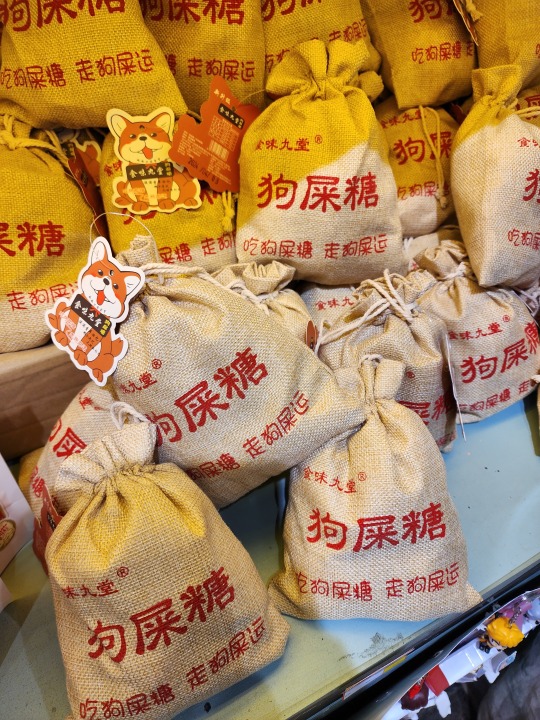
And last but not least, the ancient city walls of Xi'an. The city walls that we see here were built at the beginning of Ming dynasty (latter half of 14th century), but analysis of the cross section revealed that it also contained sections of the Tang-era (618 - 907), Song-era (960 - 1279), and Yuan-era (1206 - 1368) city walls within it in layers. These walls are 12m (39.4ft) tall and the top of the wall is 12-14m (39.4-46ft) wide, enough to pass multiple horse-drawn carts at once, which was important for the defense of the city. Below is the Anyuan Gate/安远门 (the north gate), and this used to be where the Tang-era Taiji Palace/太极宫 (not to be confused with Taiji Hall of the Forbidden City) wall connected with the Eastern Palace/东宫, where the crown prince resided:
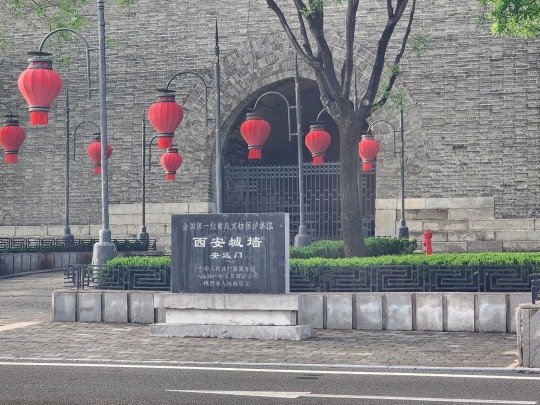
Coming around the side gate of Anyuan Gate. There's also a moat (护城河 in Chinese, lit. "protect city river"), but I didn't take pictures of it.

Outside the Shangwu Gate/尚武门. 尚武 roughly translates to "respect of the martial". There used to be draw bridges outside these gates as well, but for ease of modern transportation, most of them have been rebuilt as fixed bridges with roads on top for vehicles and pedestrians. The only draw bridge that has been rebuilt (that I know of) was the one outside the Yongning Gate/永宁门 aka the southern gate.
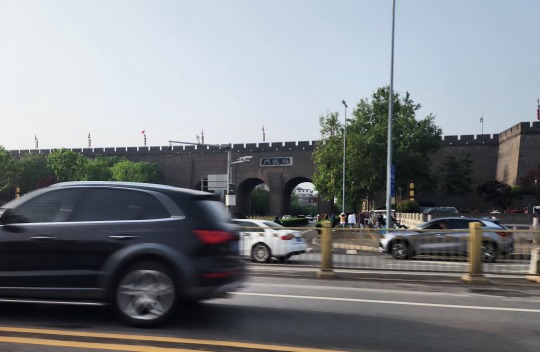
Leaving Xi'an city. These are the corner towers of the city wall:


Two cute sculptures inside the Xi'an Xianyang International Airport/西安咸阳国际机场, the left one represents Shaanxi's Qinqiang/秦腔 folk opera, and the right one is, of course, the famous terra cotta soldier:
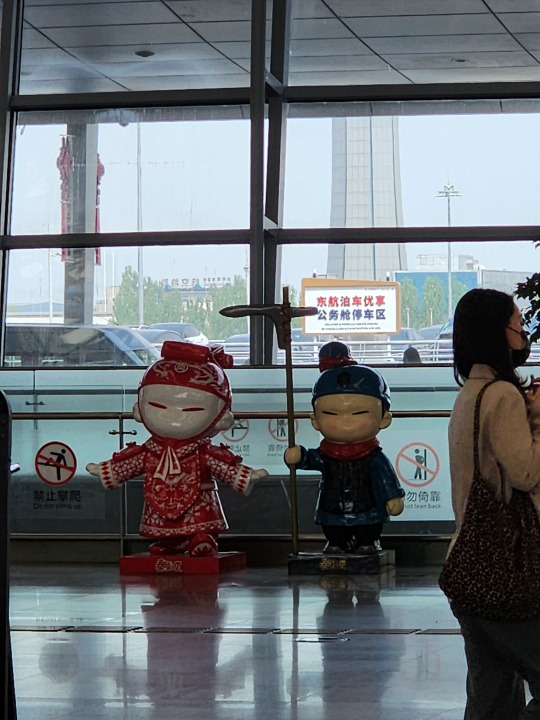
Goodbye Xi'an! Hopefully I can come back in the future and go to Shaanxi History Museum..........
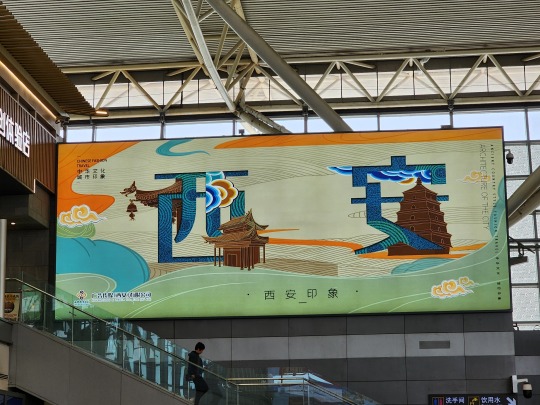
#2024 china#xi'an#china#bell tower#drum tower#xi'an city walls#chinese architecture#chinese history#chinese culture#architecture#history#culture
65 notes
·
View notes
Text

〔Bài dịch số 1072〕 ngày 10.08.2023 :
1. “你热闹万分 你孤身一人 你开怀大笑 你泪流成河 你若无其事 你跌跌撞撞 你平静无比 你竭嘶底里 你假装光芒万丈 你内心一片废墟” - Một bạn rất náo nhiệt, một bạn rất đơn côi, một bạn vui vẻ cười to, một bạn khóc lóc đau lòng, một bạn thản nhiên như không, một bạn vấp ngã đứng dậy, một bạn vô cùng bình tĩnh, một bạn gào thét trong lòng, một bạn giả vờ tỏa sáng, trái tim của bạn bị đè nát trong đống hoang tàn.
📌 Trích từ phần bình luận trong bài hát 《失踪人口 - Người Mất Tích》 trên NetEase Music
2. “人在年轻的时候,莫不是希望这一生就是琴棋书画诗酒花。可终究,还是逃不过柴米油盐酱醋茶” "Thời còn son trẻ, con người hẳn là đều hy vọng cuộc đời mình là những nốt nhạc, quân cờ, thư họa, vần thơ. Nhưng tới cuối cùng, vẫn không thoát khỏi tình cảnh củi, gạo, dầu, muối, nước tương, dấm, trà!"
📌 Trích từ phần bình luận trong bài hát 《茶酒伴 - Tà Tửu Phán》 trên NetEase Music
3. “这个世界上 有一些客观存在 永远无法改变的现实 水永远冰 玫瑰永远红 我们永远不能在一起” Thế giới này có một số hiện thực khách quan không bao giờ có thể thay đổi được, ví như nước luôn lạnh, hoa hồng luôn đỏ, chúng ta mãi mãi không thể bên nhau!
📌 Trích từ phần bình luận trong bài hát 《战 - Chiến》 trên NetEase Music
4. “你是一场北风,我是四海为家的浪子,相伴举杯赏雪,一起醉到立春,你走以后,我的醉意却停留一季又一季,经了万水和千山” Người là bức phong cảnh, tôi là kẻ lãng tử phiêu du bốn bể, cùng nhau nâng cốc thưởng tuyết rơi, cùng nhau say túy tới xuân về, sau khi người đi, cơn say của tôi lưu lại từng mùa lại từng mùa, vượt qua cả vạn dặm sông núi!
📌 Trích từ phần bình luận trong bài hát 《???》 trên NetEase Music
5. “我真的好喜欢听喜欢的人每天和我嘀嘀咕咕分享一些看似没有营养的废话,起的太早了好困哦,今天太冷了风太大了,刚才吃的饭不好吃,我想喝奶茶,你看外面的月亮好圆啊,太好了明天又是晴天” Mình thực sự rất thích người mình thương líu ríu chia sẻ với mình những mẩu chuyện nho nhỏ thường ngày, ví như dậy sớm quá buồn ngủ, hôm nay quá lạnh gió quá to, cơm vừa ăn không ngon, mình muốn uống trà sữa, cậu nhìn trăng bên ngoài tròn chưa kìa, tốt quá, ngày mai lại là một ngày nắng!
📌 Trích từ phần bình luận trong bài hát 《山河星光 - Sơn Hà Tinh Quang》 trên NetEase Music
6. “在年轻的时候 如果你爱上了一个人 请你 请你一定一定要温柔地对待他 长大了以后 你才会知道 在蓦然回首的刹那 没有怨恨的青春才会了无遗憾 如山冈上那轮静静的满月” Khi bạn còn trẻ, nếu như bạn yêu một người, xin bạn, xin bạn nhất định phải đối xử với người ấy thật dịu dàng, khi bạn lớn rồi, bạn mới biết được rằng, trong một khoảnh khắc tôi chợt nhìn lại, nếu như thanh xuân không có oán hận thì sẽ không có tiếc nuối, giống như vầng trăng rằm lặng lẽ đứng trên núi đồi.
📌 Trích từ phần bình luận trong bài hát 《年少有为 - Niên Thiếu Hữu Vi》 trên NetEase Music
7. “男人这辈子最喜欢做的两件事:第一,拖好女人下水,第二,劝坏女人从良。女人,这辈子最喜欢做的两件事:第一,跟渣男人谈恋爱,第二 把好男人当作备胎。” Hai việc mà con trai thích làm nhất trên đời : Đầu tiên, làm chuyện xấu với người con gái tốt; Thứ hai, khuyên người con gái xấu hoàn lương. Hai việc mà con gái thích làm nhất trên đời : Đầu tiên, yêu đương với trai xấu; Thứ hai : Đem trai tốt làm lốp dự phòng!
📌 Trích từ phần bình luận trong bài hát 《开始懂了 - Bắt Đầu Hiểu Ra》 trên NetEase Music
8. “只有爸爸和女儿才是世上最坚固的情人 他喜欢你素颜��化妆 喜欢你长发扎马尾 他教育你不要乱花钱然后递上银行卡 他从来没说过我爱你却又比谁都爱你 他在电话里听见你哭泣的时候 会沉默然后说回来吧 我养你” Chỉ có bố và con gái mới là tình nhân kiên cố nhất trong cuộc đời này, bố thích gương mặt mộc của bạn, thích tóc đuôi ngựa của bạn, bố dạy bạn không được tiêu tiền lung tung sau đó lại đưa thẻ cho bạn, bố chưa từng nói yêu bạ nhưng lại yêu bạn hơn bất kì ai, bố nghe thấy bạn khóc trong điện thoại chỉ trầm mặc rồi nói rằng "quay về đi, bố nuôi con!"
📌 Trích từ phần bình luận trong bài hát 《That Girls》 trên NetEase Music
9. “聚散无常,来来往往,学会感谢每个陪你走过一段时光的人,无论好坏悲喜,都要心存感激,也希望离开的人不经意想起我的时候,能够面带微笑” Tan hợp vô thường, đến rồi lại đi, học cách cảm ơn mỗi một người đi qua cuộc đời bạn, bất luận là vui buồn hờn dỗi, đều phải cảm kích ngôn nguôi, cũng hy vọng những người đã rời xa tôi ấy trong một khắc nào đó khi nghĩ về tôi, có thể đượm một nụ cười trên môi.
📌 Trích từ phần bình luận trong bài hát 《你只是经过 - Hắn Chỉ Là Lướt Qua》 trên NetEase Music
10. “想来也真怂 那么想你 也不敢打扰你” Nghĩ cũng thấy thật ngốc nghếch, nhớ anh như vậy nhưng lại không dám làm phiền anh.
📌 Trích từ phần bình luận trong bài hát 《嘿亲爱的 - Này Anh Yêu》 trên NetEase Music
- (Vũ Thu Hoài/baosam1399 dịch)
270 notes
·
View notes
Text
youtube
最新信仰影片,基督徒在中共残害折磨中濒临死亡,她祷告依靠神,从死亡边缘活过来回复健康🕊️✝️
1 note
·
View note
Text
求主擘生命饼 | Break Thou the Bread of Life | 赞美诗
第一节 Verse 1 Break Thou the Bread of Life, Dear Lord, to me, 求主擘生命饼,施恩给我, 注释:这里的”**生命饼**”直接呼应约翰福音6:35,「我就是生命的粮」,表达对基督这位生命之粮的渴慕。 As Thou didst break the loaves Beside the sea; 如同当年擘饼,海边分施; 注释:引用马太福音14:19中**五饼二鱼**的神迹:「拿着这五个饼,两条鱼,望着天祝福,擘开饼」 Beyond the sacred page I seek Thee, Lord; 超越圣页之外,寻求我主, 注释:对应约翰福音5:39-40,「你们查考圣经,因你们以为内中有永生;给我作见证的就是这经。然而,你们不肯到我这里来得生命。」表明读经的目的是要遇见基督。 My spirit pants for…
0 notes